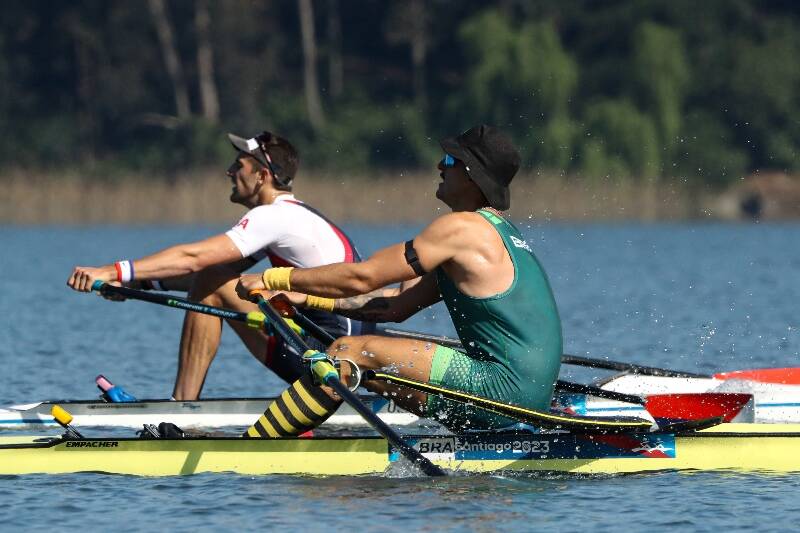The quadrennial Pan American games were hosted by Chile from Oct. 20 through Nov. 5, with more than 5,000 athletes from 41 countries competing in 400 events in 39 sports.
In that elite field was Vashon’s own Jacob Plihal, VHS grad from the class of 2014 and elite U.S. National rower, who competed in the Men’s single sculls and a new event for the games, the mixed eight. The rowing events were early in the games starting on October 20 and lasting for five days.
Although most of the games were conducted in and around Santiago, the Chilean capital, the rowing venue (as it was for the qualifying races in the spring) took place at San Pedro de la Paz, on the coast about 300 miles south of the capital city.
Being in the southern hemisphere, the area is now entering springtime with comfortable high temperatures in the 60s, relatively low humidity and light winds; perfect weather for an all-out 2,000-meter sprint in a rowing shell.
Although rowing is terrific whole-body exercise, the majority of the power comes from driving with the legs. Rowers are typically tall because the length of water swept by the oar blade on each stroke is a key success factor. At 6’10”, Plihal, a 27-year-old Vashon Island Junior Crew alum, is taller than most and he has worked his way to the top of his sport.
In Chile, Plihal was the favorite for the men’s single sculls having won the spring qualifier, but the final would prove to be a battle. Winning his qualifying heat and one of the two semi-finals, Plihal rowed in lane 3 (of 6) right next to his primary challenger from Brazil in lane 4.
The Brazilian, who is the most accomplished sculler in Brazilian history and a top 12 finisher in the Tokyo Olympics, jumped out to an early lead of almost a second after 500 meters. Through the middle of the race Plihal slowly reeled him in, behind about a third of a second — less than a quarter of a boat length — at the 1,500-meter mark.
Alas, the final 500 meters didn’t work out as hoped for and Plihal finished second by 1.17 seconds – 6:58.76 to 6:59.93.
Plihal recounted these thoughts: “It was a battle all the way down the course. I had beaten Lucas in the spring qualifier but didn’t quite have enough in the last 100 meters in the final. Congratulations to him. He has become a friend and someone I greatly respect. He is a Brazilian hero, and I am happy for that. I look forward to a potential rematch in 2027.”
The last medalist in this event for the US in the Pan Am games was in 2003 and the last silver medal in 1999 – making Plihal’s medal a noteworthy feat.
The other event, the mixed eight (four men and four women rowers with a coxswain), was the first time this configuration had been competed in international competition. Plihal had to adjust to sweep (one oar per rower) rowing rather than sculling as in the single event. The US team hadn’t rowed together before they arrived in Chile, so there was a learning curve.
In their heat, the US missed first place by 40 milliseconds and had to proceed to a “repechage” round for a chance to row in the final. The word “repechage” means “to fish again,” or in a rowing context, to re-row against a shuffled competitive lineup. The US boat won the “rep” by six seconds.
Plihal said that in hindsight it was a blessing that they had to row another race, as it doubled their competitive experience.
In the final, the boat from Chile got off to a jackrabbit start with the US trailing in second. By the 1,000-meter mark the US boat was up by three-quarters of a second, and 1.3 seconds by the 1,500-meter buoy. During the sprint the Chileans closed the gap, but the US prevailed, winning by just under a second.
“It felt like a solid row, and since this was the first time for this event in international competition, we technically hold the world record,” Plihal said.
Back at his home base in Craftsbury, Vermont, Plihal is digging back into training. There are several opportunities over the next six months to compete for a place on the US Olympic team for Paris in 2024. Vashon is thrilled by Plihal’s achievements.
Pat Call is an island masters rower.



